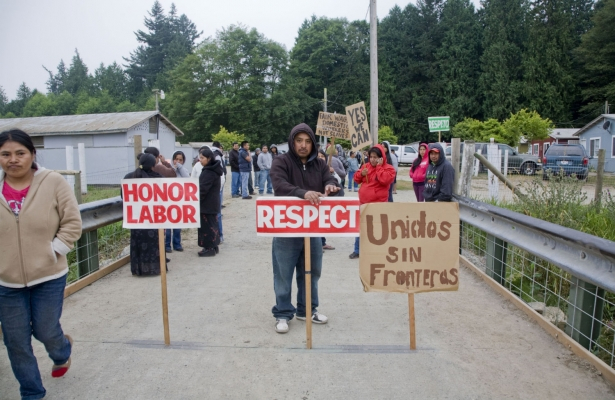Farm Backs Off Threat to Use Guestworkers as Scabs

Berry workers at Sakuma Farms in Washington won a reprieve when their employer agreed not to seek guestworkers to replace them. They've struck several times for better pay and against harassment and an unfair firing. Photo: David Bacon.
Berry pickers in Washington State went on multiple strikes last year, demanding justice for a fired co-worker, 70 cents per pound of berries picked, and an end to sexist and racist harassment by their supervisors. Management responded by trying to break their union and replace them with guestworkers. David Bacon tells more in the article below, first published in The Nation.
But since then, there’s good news: the nonprofit Farmworker Justice announced June 3 that the farm has withdrawn its application for guestworkers. Bruce Goldstein, president of the group, says the move “points to an obvious final resolution: bring back the experienced Familias Unidas workers who said they are ready to work for Sakuma, and enter into a formal contractual agreement over wages and working conditions that will ensure a stable and ready work force for the company going forward.” –Julia Kann
In 2001 Rosario Ventura came to the United States from Mexico and went to work in Washington State, picking blueberries for Sakuma Farms…Ventura’s job doesn’t pay much—at a piece-rate wage, it often averages just below state minimum wage, she says. It provides work for only half the year, leaving her family to migrate hundreds of miles to look for employment to fill out the other months. But the Sakuma job has been constant. In the insecure world of farm labor, it has allowed her family to survive.
That may not be true much longer, however.
This year Sakuma Farms applied for H-2A work visas for 438 workers it intends to bring from Mexico to work during the harvest, from June 18 to October 15. Afterward, they would have to go back to Mexico. Sakuma, one of the largest berry growers in Washington state, hires about 500 workers each picking season. If it recruits 438 of them in Mexico, there will not be enough work for those like Ventura, who have been laboring in its fields every year…
What is happening to Rosario Ventura… is a window into a possible future for farm workers. For workers already here, that future includes lost jobs. For growers, the same future holds government-administered programs giving them a source of temporary workers at close to minimum wage, who go back to Mexico when the work is done…

SUPPORT LABOR NOTES
BECOME A MONTHLY DONOR
Give $10 a month or more and get our "Fight the Boss, Build the Union" T-shirt.
Workers question the company’s eligibility to recruit H-2A workers. [The Department of Labor] Fact Sheet #26 says clearly: “Employers must also assure that there is no strike or lockout in the course of a labor dispute at the worksite.” Last year Ventura, Galicia and 250 workers went on strike at Sakuma Farms several times…
In the course of the work stoppages workers formed an independent association, Familias Unidas por la Justicia—Families United for Justice…
Last year Familias Unidas por la Justicia wanted an improvement in both hourly wages and the piece rate—a $14 hourly guarantee, and a minimum price of $6 for a fifteen-pound box of blueberries. The company would not pay more than $4 a box, and a $12 per hour guarantee, saying that the higher demand would raise its labor costs too much.
When the company was questioned about why it needed H-2A workers, it said a labor shortage had led to the loss of blackberries and strawberries—it couldn’t find enough workers to pick them. But the farm was also unwilling to raise its wages to attract additional pickers.
Click here for David Bacon's full report, originally published by The Nation.




